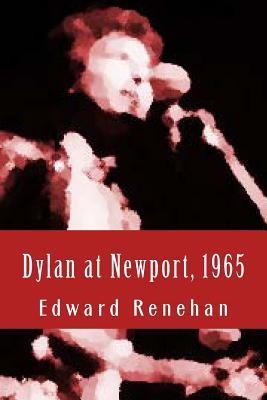
- We will send in 10–14 business days.
- Author: Edward Renehan
- Publisher: New Street Communications, LLC
- ISBN-10: 0692464603
- ISBN-13: 9780692464601
- Format: 15.2 x 22.9 x 0.4 cm, minkšti viršeliai
- Language: English
- SAVE -10% with code: EXTRA
Reviews
Description
One of the most famous moments of the Sixties - and one which continues to this day to be grossly misconstrued, mistold, and loaded with undeserved meaning - is the night in July of 1965 when Bob Dylan played an electric set (or at least tried to play an electric set) at the Newport Folk Festival: an event after which, supposedly, the culture of the Sixties was never quite the same again.
Even Dylan's most pre-eminent chronicler Sean Wilentz has mischaracterized this evening as the night when "[Alan] Lomax along with Pete Seeger led the old guard that objected to the blasts of white-boy electricity, including Dylan's." Seeger biographer David Dunaway speaks of Dylan understanding that at Newport "the electric guitar meant a declaration of war" and that, intensely ambitious, he sought publicity by smuggling "rock into the citadel of folk music." In this narrative, battle lines were drawn, a fight waged, and a revolution begun. The over-simplification is too attractive to resist. Our tribal memory absolutely yearns for Dylan's abbreviated, 15-minute performance to be a pivot point not just from acoustic to electric, but also from traditional to commercial, from topical to cynical, and from roots to revolution. We also want Newport to be a "citadel of folk music,"and to be comfortable with any number of other safe, easy assumptions. For this symbology to work, however, we need an "old guard" to rebel against, and a youthful "new guard" to do the rising up. We also need to believe that traditional acoustic music cannot be (and was not at that time already) commercial, that electric music can never be traditional, that electric music is always commercial, that the Newport Fest (only a few years old) represented some sort of "hallowed ground" of acoustic music, and that various other straight lines apply. They don't. In this book, critically-acclaimed author Edward Renehan examines how and why.- Author: Edward Renehan
- Publisher: New Street Communications, LLC
- ISBN-10: 0692464603
- ISBN-13: 9780692464601
- Format: 15.2 x 22.9 x 0.4 cm, minkšti viršeliai
- Language: English English
One of the most famous moments of the Sixties - and one which continues to this day to be grossly misconstrued, mistold, and loaded with undeserved meaning - is the night in July of 1965 when Bob Dylan played an electric set (or at least tried to play an electric set) at the Newport Folk Festival: an event after which, supposedly, the culture of the Sixties was never quite the same again.
Even Dylan's most pre-eminent chronicler Sean Wilentz has mischaracterized this evening as the night when "[Alan] Lomax along with Pete Seeger led the old guard that objected to the blasts of white-boy electricity, including Dylan's." Seeger biographer David Dunaway speaks of Dylan understanding that at Newport "the electric guitar meant a declaration of war" and that, intensely ambitious, he sought publicity by smuggling "rock into the citadel of folk music." In this narrative, battle lines were drawn, a fight waged, and a revolution begun. The over-simplification is too attractive to resist. Our tribal memory absolutely yearns for Dylan's abbreviated, 15-minute performance to be a pivot point not just from acoustic to electric, but also from traditional to commercial, from topical to cynical, and from roots to revolution. We also want Newport to be a "citadel of folk music,"and to be comfortable with any number of other safe, easy assumptions. For this symbology to work, however, we need an "old guard" to rebel against, and a youthful "new guard" to do the rising up. We also need to believe that traditional acoustic music cannot be (and was not at that time already) commercial, that electric music can never be traditional, that electric music is always commercial, that the Newport Fest (only a few years old) represented some sort of "hallowed ground" of acoustic music, and that various other straight lines apply. They don't. In this book, critically-acclaimed author Edward Renehan examines how and why.

Reviews